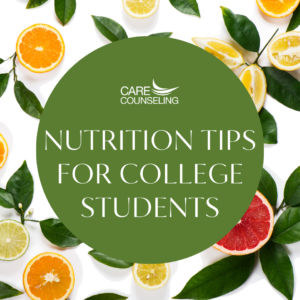Nutrition Tips for College Students
 While it’s normal to face dietary challenges during this phase, maintaining a balanced diet is crucial for your overall health, energy levels, and academic performance. In this blog post, we’ll explore essential nutrition tips for college students to help you make healthier choices and establish good eating habits.
While it’s normal to face dietary challenges during this phase, maintaining a balanced diet is crucial for your overall health, energy levels, and academic performance. In this blog post, we’ll explore essential nutrition tips for college students to help you make healthier choices and establish good eating habits.
- Start Your Day Right with Breakfast
It’s easy to skip breakfast when rushing to early morning classes, but this meal is the foundation of your day. A nutritious breakfast provides essential nutrients and helps you stay focused and alert. Opt for options like whole-grain cereal, oatmeal, Greek yogurt with fruit, or a veggie omelet for a satisfying start to your day.
- Choose Whole Grains
Whole grains are rich in fiber and nutrients, making them a healthier choice compared to refined grains. Incorporate whole-grain options like brown rice, whole wheat pasta, and whole-grain bread into your meals. They provide sustained energy and help keep you full for longer.
- Balance Your Plate
When planning your meals, aim for a balanced plate that includes a variety of food groups. Fill half your plate with vegetables and fruits, one-quarter with lean proteins like chicken, fish, tofu, or beans, and one-quarter with whole grains. This approach ensures you get a well-rounded mix of nutrients.
- Snack Wisely
Snacking can be a pitfall for college students, often leading to the consumption of unhealthy, high-calorie options. Opt for nutrient-dense snacks like fresh fruit, nuts, yogurt, or cut-up vegetables with hummus. These snacks provide energy without causing a sugar crash.
- Stay Hydrated
Proper hydration is essential for overall health and cognitive function. Carry a reusable water bottle with you and make it a habit to drink water throughout the day. Limit sugary drinks like soda and opt for water, herbal tea, or flavored water with a slice of citrus for added taste.
- Mind Your Portions
Portion control is key to maintaining a healthy weight and avoiding overeating. Pay attention to portion sizes, and if you’re dining out, consider sharing dishes or asking for a to-go box to pack up half of your meal before you start eating.
- Plan Ahead
Planning your meals and snacks in advance can help you make healthier choices. Create a weekly meal plan and shopping list, and try to prepare meals at home whenever possible. This not only saves money but also allows you to control the ingredients and portion sizes.
- Limit Processed Foods
Processed foods, such as frozen meals, chips, and sugary snacks, are often high in sodium, unhealthy fats, and added sugars. While they may be convenient, they should be consumed in moderation. Opt for whole, unprocessed foods whenever you can.
- Don’t Skip Meals
Skipping meals can lead to overeating later in the day and can negatively affect your energy levels and concentration. Even if you have a busy schedule, make an effort to have regular, balanced meals.
- Practice Moderation
College life often includes social events and opportunities to indulge in treats and fast food. While it’s okay to enjoy these occasional indulgences, practice moderation. Balance them with healthier choices throughout the week to maintain a nutritious diet.
- Listen to Your Body
Pay attention to hunger and fullness cues. Eating when you’re hungry and stopping when you’re satisfied can help you avoid mindless snacking and overeating. Be mindful of your body’s signals.
- Seek Nutrient-Dense Foods
Nutrient-dense foods provide a high amount of vitamins, minerals, and other nutrients with fewer calories. Examples include leafy greens, berries, lean proteins, and whole grains. These foods offer maximum nutritional benefits for your calorie intake.
- Consider Dietary Restrictions
If you have dietary restrictions or preferences, such as vegetarianism, veganism, or gluten intolerance, plan your meals accordingly. There are many resources and recipes available to help you maintain a balanced diet within your dietary preferences.
- Learn to Cook
Cooking your meals not only allows you to control what goes into your food but also can be a fun and money-saving skill to develop. Start with simple recipes and gradually expand your cooking repertoire.
Nutrition is a crucial aspect of your overall well-being, especially during your college years when you need sustained energy and mental clarity to excel academically and enjoy your social life. Remember that making small, sustainable changes in your diet can have a significant impact on your health and overall vitality. Prioritize your nutrition, and you’ll set yourself up for success both inside and outside the classroom.



























